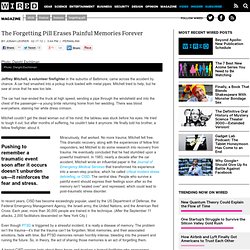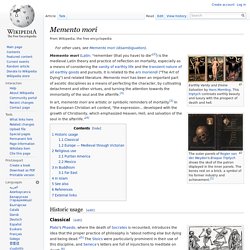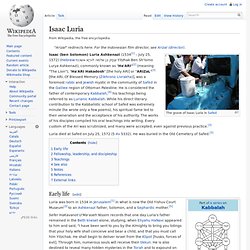

The Forgetting Pill Erases Painful Memories Forever. Photo: Dwight Eschliman Jeffrey Mitchell, a volunteer firefighter in the suburbs of Baltimore, came across the accident by chance: A car had smashed into a pickup truck loaded with metal pipes.

Mitchell tried to help, but he saw at once that he was too late. The car had rear-ended the truck at high speed, sending a pipe through the windshield and into the chest of the passenger—a young bride returning home from her wedding. There was blood everywhere, staining her white dress crimson. Mitchell couldn’t get the dead woman out of his mind; the tableau was stuck before his eyes. Pushing to remember a traumatic event soon after it occurs doesn’t unburden us—it reinforces the fear and stress. Miraculously, that worked. In recent years, CISD has become exceedingly popular, used by the US Department of Defense, the Federal Emergency Management Agency, the Israeli army, the United Nations, and the American Red Cross. Mitchell was right about one thing, though. None of this is true. Think Twice: How the Gut's "Second Brain" Influences Mood and Well-Being. As Olympians go for the gold in Vancouver, even the steeliest are likely to experience that familiar feeling of "butterflies" in the stomach.

Underlying this sensation is an often-overlooked network of neurons lining our guts that is so extensive some scientists have nicknamed it our "second brain". A deeper understanding of this mass of neural tissue, filled with important neurotransmitters, is revealing that it does much more than merely handle digestion or inflict the occasional nervous pang. The little brain in our innards, in connection with the big one in our skulls, partly determines our mental state and plays key roles in certain diseases throughout the body.
Although its influence is far-reaching, the second brain is not the seat of any conscious thoughts or decision-making. www.gerhard-schuhmacher.com/nofr/essays/philosophy_aristotle.pdf. Varanasi. Varanasi (Hindustani pronunciation: [ʋaːˈraːɳəsi] ( )), also known as Benares,[4] Banaras (Banāras [bəˈnaːrəs] ( )) or Kashi (Kāśī [ˈkaːʃi] ( )), is an Indian city on the banks of the Ganges (Ganga) in Uttar Pradesh, 320 kilometres (200 mi) southeast of the state capital, Lucknow.

It is the holiest of the seven sacred cities (Sapta Puri) in Hinduism and Jainism, and played an important role in the development of Buddhism. Some Hindus believe that death at Varanasi brings salvation. Memento mori. Earthly Vanity and Divine Salvation by Hans Memling.

This triptych contrasts earthly beauty and luxury with the prospect of death and hell. Isaac Ben Solomon Luria. Isaac Luria. The grave of Isaac Luria in Safed Isaac (ben Solomon) Luria Ashkenazi (1534[1] – July 25, 1572) (Hebrew:יִצְחָק בן שלמה לוּרְיָא אשכנזי Yitzhak Ben Sh'lomo Lurya Ashkenazi), commonly known as "Ha'ARI"[2] (meaning "The Lion"), "Ha'ARI Hakadosh" [the holy ARI] or "ARIZaL"[3] [the ARI, Of Blessed Memory (Zikhrono Livrakha)], was a foremost rabbi and Jewish mystic in the community of Safed in the Galilee region of Ottoman Palestine.

He is considered the father of contemporary Kabbalah,[4] his teachings being referred to as Lurianic Kabbalah.
Mind-Body. Rubin Museum of Art:A Golden Swan in Turbulent Waters. Museum of Art Wednesday September 19, 2012 @ 7:00 PMPrice: $14.00Member Price: $12.60 The stand-by list becomes available at the admissions desk exactly two (2) hours before the start of the program.

You must be physically present to sign up on the list. Any available tickets will be released to the stand-by list, in order, beginning ten minutes before the start of the program. Each person can purchase up to two tickets. Chairman's Circle members of the museum have first priority to purchase tickets for sold-out programs, should tickets become available.
Bikram Yoga and Anxiety. Anxiety: We worry.

A gallery of contributors count the ways. In the fall of 2007, I attended my first yoga class. For more than four years — ever since graduation had dumped me into adulthood — I’d been leveled by anxiety. My days were plagued with worry. Was I living correctly? I’d heard that yoga was relaxing. I looked at the door. Juliette Etrivert “Come back tomorrow,” the teacher told me. But after class, when I left the studio and felt the cool air on my skin, I floated, as if I were walking home on a moving sidewalk, or even hovering just above one. The next day, I bought Shakti shorts (the unofficial Bikram yoga uniform), returned to class and relinquished my earthly possessions (well, my gym membership). “Come back tomorrow,” the teacher told me again during final savasana. The Bikram yoga philosophy maintains that if you practice the series every day, you’ll need nothing else in your life: no drugs, no gym, no situps, no excess food or cigarettes or unhealthy relationships.
Poeisis.